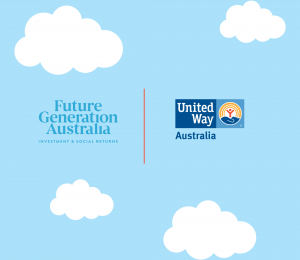 It’s the not-for-profit sector’s Catch-22. Charities need evidence of the impact that donations make in order to attract donors – but first they need donations in order to build that body of evidence.
It’s the not-for-profit sector’s Catch-22. Charities need evidence of the impact that donations make in order to attract donors – but first they need donations in order to build that body of evidence.
“This is why it is so important for philanthropists to be prepared to take a risk with their charitable giving,” says Emily Fuller, Social Impact Manager for the Future Generation companies. “And to do that for long enough to give charities the time they need to generate that evidence.”
The Dolly Parton Imagination Library is a case in point. The charity distributes free books each month to children from birth to age five in order to improve childhood literacy and was established in Australia in 2014, with Future Generation Australia an early backer. Last year alone, the Imagination Library gave 132,631 books to more than 11,000 children.
Maria Bozic is head of partnerships at United Way Australia, which brought the Dolly Parton Imagination Library to Australia. She says the program’s successful rollout could not have been achieved without Future Generation’s early vote of confidence. The funding helped the library to prove its concept in the Australian marketplace, paving the way for it to attract other private and corporate donors.
“It’s been a tremendous vote of confidence to receive support from Future Generation Australia on the scale they provide. It has a hugely positive psychological impact,” Bozic says.
The Imagination Library recently secured $8 million in funding from the NSW government. While the arrangement’s terms are still being finalised, it will allow United Way to double the amount of children benefitting by extending the library’s services throughout regional NSW and in areas of disadvantage in Greater Western Sydney.
Fuller says that it is important for philanthropists to identify charities with high potential, but low funding – and then support them to get the runs on the board they need to attract more mainstream funding sources, such as fee for service or government support.
“It is encouraging to see this occur with United Way and the Imagination Library. It’s a reminder of the tremendous effect of reading to our kids from day dot,” says Fuller.
Putting the funds to work
United Way’s mission is to help Australians in communities of disadvantage to reach their full potential. “United Way Australia find ways to spark the potential of children who might otherwise be left behind,” says CEO Clayton Noble.
Aside from buying books for the Imagination Library, Future Generation Australia’s funds helped United Way with transitional funding to get a community started with the library before it finds its own funding sources.
“The Imagination Library is community-led. It’s not something we start up in a community because we think they want it. We work alongside lots of different groups like Rotary and local libraries, because literacy is so much more effective when it’s supported by an entire community,” says Bozic.
In Tamworth alone, every child has access to the Imagination Library. Funds have also been used to extend United Way’s work with foster children in Victoria. Says Bozic: “We have been able to continue to deliver books to children until they either graduate from the program at age five or until we get additional funding, because we never want to turn anyone away.”
The early intervention difference
While many of us take reading and writing for granted, others have not been given the same opportunities to learn these skills. According to United Way’s figures, one in five – or three billion – people around the world are illiterate. The cost to the global economy is US$1.5 trillion a year.
Australia is not immune. According to the 2018 Australian Early Development Census, 22 per cent of Australian children start school developmentally vulnerable and in some communities that figure rises to one in three children. The latest data from the United Nations Educational, Scientific and Cultural Organization (UNESCO) shows there are still 774 million people over age 15 around the world who can neither read nor write.
Early intervention makes all the difference. Data from the 2018 Australian Early Development Census shows by the age of five, when most children start school, 90 per cent of brain development has already occurred. United Way’s own research shows the difference its programs make. Its data indicates 77 per cent of care givers spent more quality time as a family with books thanks to being part of the Imagination Library. Moreover, 73 per cent of caregivers feel more confident reading to kids and it achieves a 58 per cent increase in child literacy after kids have been part of the program for six months.
“All the cognitive and linguistic building blocks are set and a child’s literacy readiness at age five strongly predicts their school journey. That will shape the adult they become, the success that they can achieve and the contribution they can make to their community,” says Bozic.
“If you can’t read and write, it’s common to become trapped in a cycle of poverty. Without a solid base of literacy and numeracy skills, you may be faced with limited opportunities for employment and income generation,” she adds.
Real results
Addressing literacy early on makes a huge difference, which is exactly what the Imagination Library sets out to achieve.
“It’s been said every dollar spent on preventative measures when it comes to literacy will save $7 down the road in terms of improved outcomes for children. But more than that, it’s so rewarding seeing kids with books and receiving letters from parents, who feel empowered because not only are their kids starting school well, as adults they’re also gaining in literacy, which is especially important when English is not the first language spoken in a home,” Bozic says.
